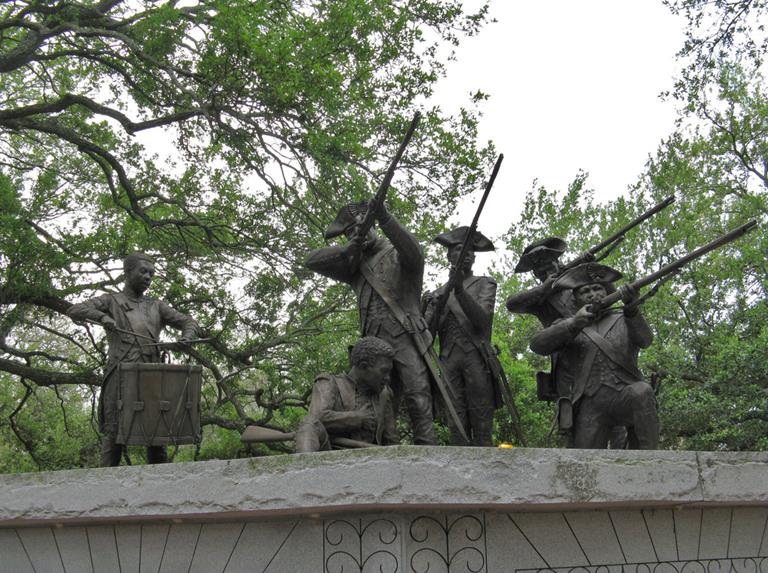HOW HAITIANS
HELPED WIN
THE AMERICAN
REVOLUTION
WHY YOU SHOULD CARE
Because the path to independence
can be hard to see in advance.
BY POOJA BHATIA
“Beyond the mountains there are mountains,” goes the Haitian saying. It refers to the country’s rugged topography, but it’s a good metaphor for much else, including stories about Haiti.
One of those concerns the Siege of Savannah in 1779, which pitted American Revolutionary forces against British imperialists in the Southern state of Georgia. More than 500 free men of color participated, recruited in colonial Saint-Domingue by a French admiral under the banner of Chasseurs Volontaires d’Amérique. It was a gross irony, of course, because the independent United States would not be a good place for black men.
Yet Haitian children learn in school how seminal the experience was for their own country’s forefathers. It was Savannah where the Haitian founders cut their military teeth; Savannah where their minds dwelled on the possibility of throwing off the French empire’s chains; Savannah that sparked thoughts of revolution, which began a dozen years later. The statue erected in Franklin Square, in Savannah, depicts five black soldiers and a little drummer boy who would grow up to become Haiti’s first ruler, Henri Christophe.
The statue and the story are supposed to evidence an enduring relationship between the United States and Haiti. The nations were the first and second republics in the New World, brothers in freedom and independence. That narrative goes back a long way, at least to 1899, when American historian T.G. Steward wrote that the soldiers “bore away from our altars the sacred fire of liberty to rekindle it in their own land.” And ever since the episode has been invoked to muster U.S. support for Haiti in times of crisis; it’s a form of gratitude.
But that’s a much prettier, tidier story than anything that took place, according to historians. First, it’s unclear whether any leaders of the Haitian revolution actually participated, says John D. Garrigus, a historian who is the foremost expert on the event. Some would claim to in later years, but Garrigus spent years trying to track down the names of the 545 freedmen who were shipped in from Saint-Domingue to participate. He only found lists of soldiers identified by number: “The French didn’t really value them enough to list them by name,” he says.
If it was intended as an overture to the Americans, the Chasseurs’ service was wasted.
The French admiral who was recruiting in Saint-Domingue, then a French colony, found opposition among whites. So he focused his efforts on free men of color — men who owned land and enjoyed rights under the regime, but whose skin color rendered them objects of racial hate. Many were coerced into joining the “volunteer” company but others were lured, Garrigus believes, by the promise of higher social status, respect and equality. Military service would render them true citizens of the empire, they thought.
They were wrong. When the men in the company reached Savannah, they dug a lot of trenches, but they saw only a little action on the front lines. The siege itself failed, with heavy casualties. And though only one Chasseur was killed and seven wounded, the rest were exiled to various corners of the world — some to France, some to Charleston and a third of the company, on the admiral’s orders, to Grenada. For almost three years after the siege, they risked their lives for a French empire that would never make them citizens, while families and farms back home languished. And if the Chasseurs’ service was intended as an overture to the Americans, it was wasted: When Haiti finally threw off the French in 1804, the slaveholding United States refused to recognize its sovereignty for many years — indeed, it regarded the free black republic as a threat.
Which is why, if the Siege of Savannah lit the slow-burning spark of the Haitian revolution, it wasn’t because the Chasseurs identified with the Americans or the cause of independence from Britain. Any relation is confounded, twisted, difficult to see, like a mountain beyond a mountain: The men of the company had discovered that whatever they did for the empire, they would never be more than second-class citizens, and probably worse. Better to be independent.
+++++++++++
Pooja Bhatia is OZY’s deputy editor. She has written for The Wall Street Journal, The New York Times and the Economist, and was once the mango-eating champion of Port-au-Prince.


